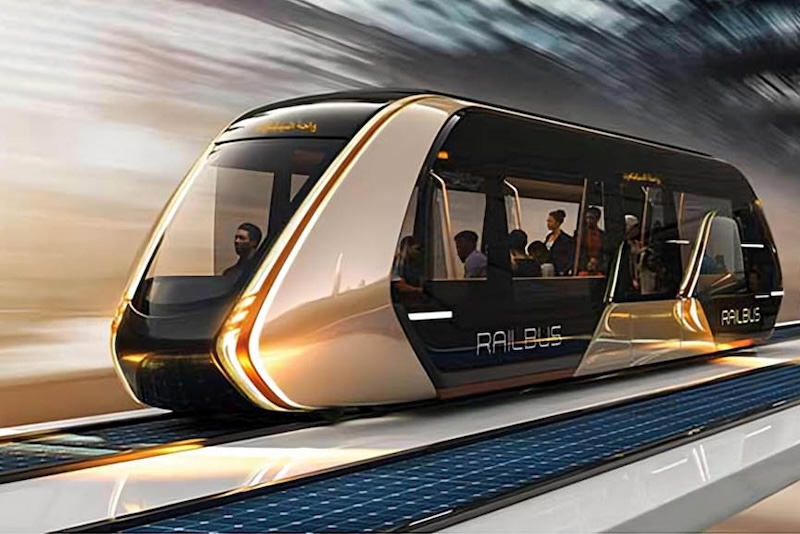The public transit sector is shifting towards renewable energy with climate change and environmental degradation becoming major concerns. From solar-powered trains to wind-powered buses, various countries are working to make public transport systems cleaner, greener, and more sustainable.
Dubai is currently in the news for the Railbus, which was unveiled at the World Government Summit in February. Currently under development by the Roads and Transport Authority of Dubai, this innovative public transport system aims to enhance urban mobility in a sustainable and efficient manner.
Railbus is a small, ultra-lightweight, driverless electric vehicle designed to operate on elevated tracks. The system is fully powered by solar energy, resulting in zero direct emissions. The interiors of the vehicles, including seats, panels, roof and floor, are made from recycled microfiber and PET plastic. This will lead to a reduction in energy consumption and CO2 emissions.
Railbus’ design focuses on cost efficiency as well. The elevated tracks, made from lightweight, non-corrosive composite materials, reduce the cost of tracks infrastructure to less than 20% of the cost of a traditional metro network that has the same length and capacity. Moreover, the use of solar power minimizes operational expenses associated with fuel.
Slated to launch soon, Railbus promises to transform urban transit in cities facing severe road congestion and infrastructure constraints, by providing a fast, efficient, and eco-friendly alternative.
Dubai is not alone. Following are some other mass transport systems making a difference in public transit by adopting renewable energy.
Germany: Solar-Powered Trains
Germany’s national railway company, Deutsche Bahn (DB), has introduced solar-powered trains, making a vital step towards green energy. Along with wind and hydropower, solar energy is increasingly becoming one of DB’s renewable energy sources.
The solar plant in Wasbek, Schleswig-Holstein, has been on the grid since April 2023. It supplies solar power directly to the German railway traction power network, which is a first for the country.
Since the beginning of 2024, 15 other solar energy parks spread across the country have been supplying Deutsche Bahn with renewable power. The trains are equipped with solar panels on the roofs that harness the power of the sun and use it to produce clean electricity.
DB aims to run completely on green electricity by 2038 and to be 100% climate neutral by 2040.
Norway: Electric Ferries
Norway has been leading the way in adoption of renewable energy sources when it comes to water transportation. The country operates the world’s first electric ferry, MS Ampere, that runs on a six-km route in the western fjords.
Powered by batteries charged with hydroelectric energy, the ferry emits zero emissions and significantly reduces noise pollution. It can carry up to 120 cars and 360 passengers. Owned and operated by Norled, Ampere has won many international awards.
The Norwegian company Fjellstrand is the world’s first shipbuilder to introduce fully battery-electric fast ferries for passengers. In 2022, MS Medstraum, the world’s first fully electric and zero-emission fast ferry, was launched by Fjellstrand. It runs between the City of Stavanger and the surrounding islands.
Medstraum won the ‘Ship of the Year’ award in 2022 at the SMM trade fair held in Germany.
Sweden: Biofuel-Powered Buses
Sweden largely relies on biofuel for its public transport, including ethanol-powered buses and biogas-powered buses. Stockholm operates buses that run on biogas, a fuel produced from organic waste such as food scraps and sewage. Ethanol-fueled buses are mainly used for inner city traffic.
Sweden has the largest ethanol bus fleet in the world and about half of Scania city buses run on ethanol. Use of fossil-free biofuels can reduce greenhouse gas emissions by up to 90%.
Reports by the Stockholm City Transport show that nitrogen oxide emissions are cut by 50% as compared to traditional diesel buses. In addition to being eco-friendly, they also promote waste recycling, turning trash into a valuable energy resource. The number of electric buses in Sweden’s public transit system has also been increasing.
Netherlands: Wind-Powered Trains
The Netherlands achieved a significant milestone back in 2017, when all electric trains in the country became the first in the world to run entirely on wind energy. This was made possible through a partnership between NS, the Dutch national railway company and Eneco, a leading energy enterprise.
According to reports, NS needs around 1.2 billion kWh of wind energy a year, which is equivalent to the total electricity consumption of all households in Amsterdam. NS and Eneco invested in new wind farms and upgraded the existing energy infrastructure to support the increased demand for electricity.
This electricity comes from wind farms in the Netherlands, as well as other European countries including Belgium, Sweden, and Finland. They supply power to the grid, ensuring a continuous and reliable energy source for trains.
India: Solar-Powered Metro Systems
India is steadily advancing in adopting renewable energy for mass public transport, particularly in its metro rail networks. Kochi Metro in the southern state of Kerala, which started operations in 2017, is one of India’s first eco-friendly metro networks, deriving 55% of its power from solar energy.
In the Indian capital, the Delhi Metro Rail Corporation sources a significant portion of its electricity from solar power plants and installed solar panels on the rooftops of its stations and workshops. In 2011, the Delhi Metro became the first metro system in the world to receive carbon credits from the United Nations for reducing greenhouse gas emissions.
The Kolkata Metro in West Bengal has also taken the solar route. It has installed solar power plants at seven metro stations, including its Dum Dum and Noapara depots, generating a total of 1.5 MW of power.
Other Indian cities, such as Jaipur, Chennai, Mumbai, Vadodara, and Bengaluru, are also embracing solar power for their metro systems ensuring a more eco-friendly and sustainable future for urban transportation.
[Representative image. Courtesy: Railbus]




